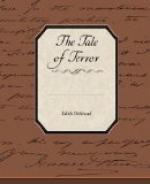“He delighted in the energies of the passions, the difficulties and tempests of life which wreck the happiness of others roused and strengthened all the powers of his mind, and afforded him the highest enjoyment... The fire and keenness of his eye, its proud exaltation, its bold fierceness, its sudden watchfulness as occasion and even slight occasion had called forth the latent soul, she had often observed with emotion, while from the usual expression of his countenance she had always shrunk.”
Schedoni is undoubtedly allied to this desperado, but his methods are quieter and more subtle:
“There was something terrible in his air, something almost superhuman. The cowl, too, as it threw a shade over the livid paleness of his face increased its severe character and gave an effect to his large, melancholy eye which approached to horror ... his physiognomy ... bore the traces of many passions which seemed to have fixed the features they no longer animated. An habitual gloom and severity prevailed over the deep lines of his countenance, and his eyes were so piercing that they seemed to penetrate at a single glance into the hearts of men, and to read their most secret thoughts—few persons could endure their scrutiny or even endure to meet them twice ... he could adapt himself to the tempers and passions of persons, whom he wished to conciliate, with astonishing facility.”
The type undoubtedly owes something to Milton’s Satan. Like Lucifer, he is proud and ambitious, and like him he retains traces of his original grandeur. Hints from Shakespeare helped to fashion him. Like Cassius, seldom he smiles, and smiles in such a sort
“As if he mock’d himself and
scorn’d his spirit
That could be moved to smile at anything.”
Like King John,
“The image of a wicked heinous fault
Lives in his eye: that close aspect
of his
Does show the mood of a much-troubled
breast.”
By the enormity of his crimes he inspires horror and repulsion, but by his loneliness he appeals, for a moment, like the consummate villain Richard III., to our pity:
“There is no creature loves me
And if I die, no soul will pity me.
Nay, wherefore should they, since that
I myself
Find in myself no pity to myself?”
Karl von Moor, the famous hero of Schiller’s Die Raeuber (1781), is allied to this desperado. He is thus described in the advertisement of the 1795 edition:
“The picture of a great, misguided soul, endowed with every gift of excellence, yet lost in spite of all its gifts. Unbridled passions and bad companionship corrupt his heart, urge him on from crime to crime, until at last he stands at the head of a band of murderers, heaps horror upon horror, and plunges from precipice to precipice in the lowest depths of despair. Great and majestic in misfortune, by misfortune reclaimed and led back to the paths of virtue.




